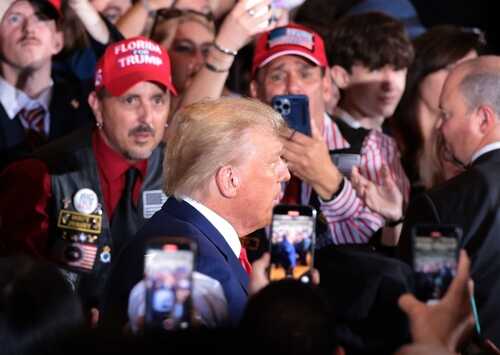(LibertySociety.com) – The fate of the American dollar’s digital twin now hangs on a knife’s edge, as the House gears up for a historic decision that could either crown the U.S. king of stablecoins, or leave it fumbling in the crypto wilderness.
At a Glance
- The Senate’s passage of the GENIUS Act marks the first real shot at national stablecoin regulation in U.S. history.
- Bipartisan wrangling, intense industry lobbying, and Trump’s personal crusade have set the stage for high-stakes House drama.
- Consumers and crypto giants alike could see sweeping changes, from new protections to a reshaped digital finance sector.
- The bill’s outcome will ripple across global markets, state regulators, and the future of American innovation.
The Stablecoin Showdown: How Washington Got Here
Picture this: a digital dollar clone, engineered to be as steady as your grandmother’s savings account, but moving at the speed of the internet. Stablecoins burst onto the scene promising just that, reliability in a world where Bitcoin’s price chart looks like a toddler’s scribble. As billions flowed into tokens like USDT and USDC, U.S. regulators started sweating. The collapse of TerraUSD in 2022 and a parade of crypto catastrophes exposed how little grip Washington had on this booming shadow banking system. Cue the entrance of politicians and regulators, all tripping over one another to slap some guardrails on the wild west of digital money.
Enter 2025: Trump launches his “Make America Stable Again” campaign, okay, not literally, but close enough. Senator Bill Hagerty rides into Congress with the GENIUS Act, promising to save us all from crypto chaos. Meanwhile, the House Financial Services Committee hustles up its own pitch, the STABLE Act. The stage is set for a legislative duel, with state regulators, crypto titans, and privacy hawks all elbowing for a say.
Who’s Holding the Leash? The Stakeholders and Their Stakes
Every good drama needs its cast of characters. Hagerty, the Tennessee Republican, is the bill’s frontman, but he’s got backup: President Trump, who’s betting his legacy on U.S. dominance in digital assets; Sen. Kirsten Gillibrand, the Democrat who’s happy to cross the aisle if it means a seat at the innovation table; and Sen. Elizabeth Warren, who’s throwing red flags like crypto is the new Big Tobacco. Industry lobbyists furiously rewrite drafts in the shadows, while consumer advocates and state regulators brace for federal overreach or, depending on their mood, sweet relief from regulatory ambiguity.
House and Senate leadership now hold the power, with a deadline looming large, August, if Trump gets his way. The pressure is on to reconcile two bills that agree on the why but brawl over the how: How much power should regulators have? Who gets to issue stablecoins, and who gets left behind? The only certainty is that everyone’s got something to lose, and nobody wants to be the one blamed if crypto goes kaboom again.
Senate Scores, House Huddles: Breaking Down the Current Play
On June 17, 2025, the Senate did what no Congress had done before: it passed comprehensive stablecoin legislation, 68–30. The gallery erupted, or would have, if C-SPAN had a laugh track. Trump and Hagerty called it a “historic” win, while Warren and company muttered about corruption and loopholes big enough to drive a blockchain through. Now, the GENIUS Act sits on the House’s doorstep, as lawmakers eye a possible clash with the previously advanced STABLE Act. Conference committees, closed-door negotiations, and more than a few midnight tweets are sure to follow.
The key sticking points? Who gets to issue stablecoins, how big those issuers can be before the feds step in, and just how closely Uncle Sam gets to peek into the sausage-making of American innovation. With committee meetings scheduled for mid-July, the final form of the law remains anyone’s guess, but the clock is ticking, and the world is watching.
What Happens If Congress Hits “Send” on the GENIUS Act?
If the House gives the green light, the U.S. instantly becomes the first global heavyweight to put its stablecoin house in order. The rules would bring clarity for crypto companies and banks, likely sending the markets on a sugar rush. Consumers get more protection (goodbye, disappearing funds and rug pulls), but scrappy startups might find themselves squeezed out by compliance costs that only the big fish can swallow.
Long-term, the U.S. could set the pace for digital asset regulation worldwide. Investors would cheer, state regulators would grumble about lost turf, and privacy groups might worry about every digital dollar leaving a paper trail. Politically, the bill is a rare bipartisan unicorn, but it’s also exposed rifts over how much trust to put in the same industry that brought us meme coins and dog-themed tokens. Whatever happens, the days of stablecoins running wild are numbered, and the next chapter in America’s digital money story is about to be written, one roll-call vote at a time.
Copyright 2025, LibertySociety.com .
Click this link for the original source of this article.
Author: Editor
This content is courtesy of, and owned and copyrighted by, https://libertysociety.com and its author. This content is made available by use of the public RSS feed offered by the host site and is used for educational purposes only. If you are the author or represent the host site and would like this content removed now and in the future, please contact USSANews.com using the email address in the Contact page found in the website menu.








